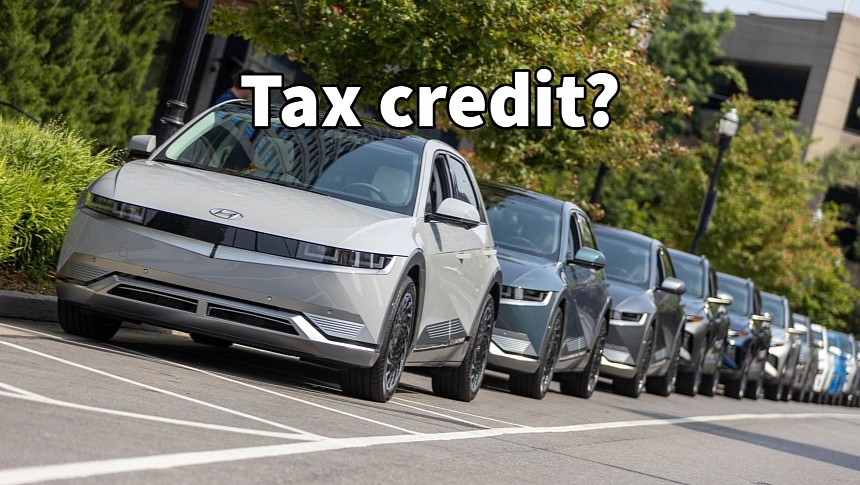When the IRS released the rules of origin at the end of March, people thought many electric vehicles would not qualify for the full $7,500 tax credit. Still, a loophole in the Inflation Reduction Act (IRA) allows those who lease their EVs to benefit regardless of where the cars and their batteries are manufactured. Despite its disadvantages, this will make EV leasing a no-brainer in the US.
Starting April 18, new electric vehicles in the US may qualify for a tax credit only if their batteries are built with raw materials coming from a country with a free-trade agreement with the US. The conditions are pretty strict and tighten with every year going forward, restricting the choice of EVs that qualify for a tax credit. Under the new requirements, many EV models were excluded from the tax credit list. In the case of Tesla, the Model 3 RWD was affected because its LFP battery was built with components from China. The most affordable Tesla model still gets half the credit, or $3,750.
Still, people soon discovered a loophole in the IRS's rules of conditions, allowing people to benefit from the maximum credit amount of $7,500 no matter what. Those who choose to lease instead of buying their electric vehicles can access the credit regardless of where the EV is made, the source of battery materials, or their income. That's because the new regulations don't specify the same restrictions for leased vehicles, all being considered "commercial vehicles." This makes any electric vehicle eligible if it's leased instead of bought.
This will make leasing the dominant way Americans access electric vehicles in the future. Marion Harris, CEO of Ford Motor Credit, the carmaker's lending branch, expects 60% of EV drivers in the US to lease rather than buy their cars in the short term. This percentage is three times higher than the 20% lease rate for ICE vehicles. Leasing is set to replace EV direct sales for brands and models that don't qualify for IRA tax credits. These include all but a handful of models from Tesla, Ford, Volkswagen, and General Motors.
According to Bloomberg, leases were 28% of Hyundai's sales in the US during the first quarter, up from 5% in 2022. When we look at the overall market, we see that the March lease rate jumped to 34% from 18% a year earlier. Automotive finance companies are also working to make leasing more attractive to consumers as the IRA loophole becomes more popular.
There are advantages and disadvantages when leasing a vehicle, so people must choose carefully. For instance, you get access to lower monthly payments and sometimes free maintenance (not that there is much on an EV) and consumables coverage. Leasing also allows the credit to be applied immediately to the monthly payments rather than waiting to get the money back next year when you file your taxes. The biggest issue is that leasing a vehicle would not make you its owner. Lease contracts also come with yearly mileage limits that might not suit everyone.
Still, people soon discovered a loophole in the IRS's rules of conditions, allowing people to benefit from the maximum credit amount of $7,500 no matter what. Those who choose to lease instead of buying their electric vehicles can access the credit regardless of where the EV is made, the source of battery materials, or their income. That's because the new regulations don't specify the same restrictions for leased vehicles, all being considered "commercial vehicles." This makes any electric vehicle eligible if it's leased instead of bought.
This will make leasing the dominant way Americans access electric vehicles in the future. Marion Harris, CEO of Ford Motor Credit, the carmaker's lending branch, expects 60% of EV drivers in the US to lease rather than buy their cars in the short term. This percentage is three times higher than the 20% lease rate for ICE vehicles. Leasing is set to replace EV direct sales for brands and models that don't qualify for IRA tax credits. These include all but a handful of models from Tesla, Ford, Volkswagen, and General Motors.
According to Bloomberg, leases were 28% of Hyundai's sales in the US during the first quarter, up from 5% in 2022. When we look at the overall market, we see that the March lease rate jumped to 34% from 18% a year earlier. Automotive finance companies are also working to make leasing more attractive to consumers as the IRA loophole becomes more popular.
There are advantages and disadvantages when leasing a vehicle, so people must choose carefully. For instance, you get access to lower monthly payments and sometimes free maintenance (not that there is much on an EV) and consumables coverage. Leasing also allows the credit to be applied immediately to the monthly payments rather than waiting to get the money back next year when you file your taxes. The biggest issue is that leasing a vehicle would not make you its owner. Lease contracts also come with yearly mileage limits that might not suit everyone.







